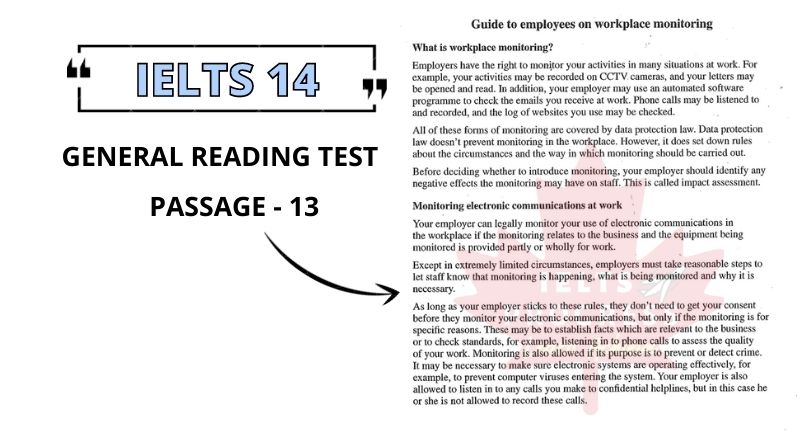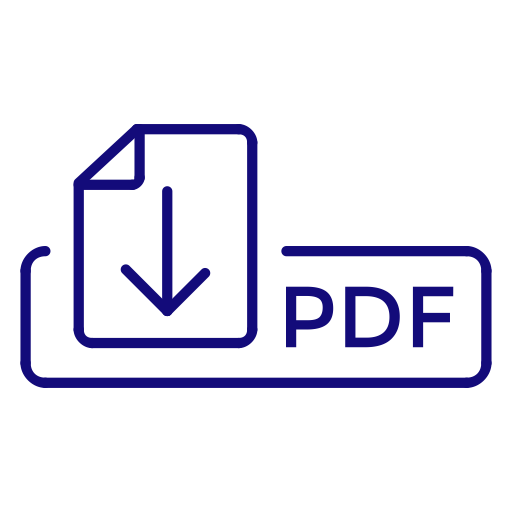IELTS General Test – Passage 13: Guide to employees on workplace monitoring reading with answers explanation, location and pdf. This reading paragraph has been taken from our huge collection of Academic & General Training (GT) Reading practice test PDFs.

Guide to employees on workplace monitoring
What is workplace monitoring?
Employers have the right to monitor your activities in many situations at work. For example, your activities may be recorded on CCTV cameras, and your letters may be opened and read. In addition, your employer may use an automated software programme to check the emails you receive at work. Phone calls may be listened to and recorded, and the log of websites you use may be checked.
All of these forms of monitoring are covered by data protection law. Data protection law doesn’t prevent monitoring in the workplace. However, it does set down rules about the circumstances and the way in which monitoring should be carried out.
Before deciding whether to introduce monitoring, your employer should identify any negative effects the monitoring may have on staff. This is called impact assessment.
Monitoring electronic communications at work
Your employer can legally monitor your use of electronic communications in the workplace if the monitoring relates to the business and the equipment being monitored is provided partly or wholly for work.
Except in extremely limited circumstances, employers must take reasonable steps to let staff know that monitoring is happening, what is being monitored and why it is necessary.
As long as your employer sticks to these rules, they don’t need to get your consent before they monitor your electronic communications, but only if the monitoring is for specific reasons. These may be to establish facts which are relevant to the business or to check standards, for example, listening in to phone calls to assess the quality of your work. Monitoring is also allowed if its purpose is to prevent or detect crime. It may be necessary to make sure electronic systems are operating effectively, for example, to prevent computer viruses entering the system. Your employer is also allowed to listen in to any calls you make to confidential helplines, but in this case he or she is not allowed to record these calls.
Questions 15-21
Complete the notes below.
Choose NO MORE THAN TWO WORDS from the text for each answer.
Write your answers in boxes 15-21 on your answer sheet.
Guide to employees on workplace monitoring
Your employer may monitor you at work by checking
• recordings of your activities
• your letters and 15…………………….
• your phone calls and which websites you have visited
Rules for monitoring are established by data protection law. This states that employers must carry out a procedure that is known as 16……………………. before introducing monitoring.
In general, monitoring is legal if
• it relates to the business
• you are using 17……………………. intended for work
• the worker has been informed
Monitoring may be used
• to evaluate the 18……………………. of your work
• to stop of find out about 19…………………….
• to stop the possibility of 20……………………. affecting systems
• to check calls to 21……………………. (these cannot be recorded)
________________
ALSO TRY:
1) IELTS 14 READING PASSAGE – COME & PLAY WALKING FOOTBALL ↗
2) IELTS 14 READING PASSAGE – DRESS REGULATIONS AT WORK ↗
3) IELTS 14 READING PASSAGE – ACHIEVE BETTER WORK-LIFE BALANCE ↗
4) IELTS 14 READING PASSAGE – SAN FRANCISCO’S GOLDEN GATE BRIDGE ↗
5) IELTS 14 READING PASSAGE – GUIDE TO ENTERTAINMENT IN WESTHAVEN ↗
________________
Answers with Explanation
Check out Guide to employees on workplace monitoring reading answers below with explanations and locations given in the text.
15 emails
16 impact assessment
17 equipment
18 quality
19 crime
20 (computer) viruses
21 (confidential) helplines
Have any doubts??? Discuss in the comments ...
If you want the pdf summary of Guide to employees on workplace monitoring reading passage and answers, please write your email in the comment section below. We’ll send it across at the speed of light.

ALL THE BEST !